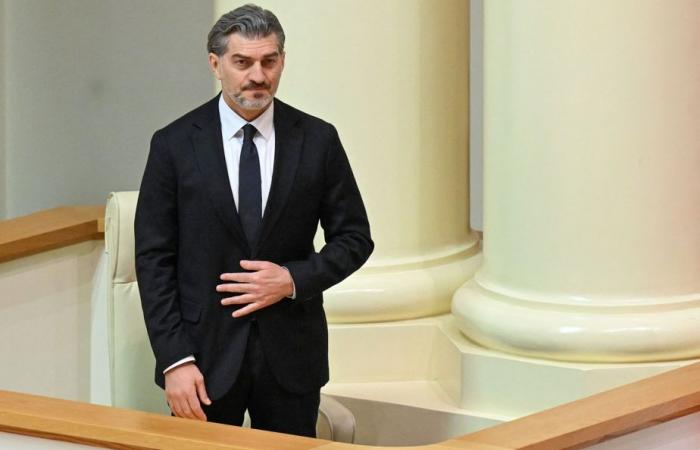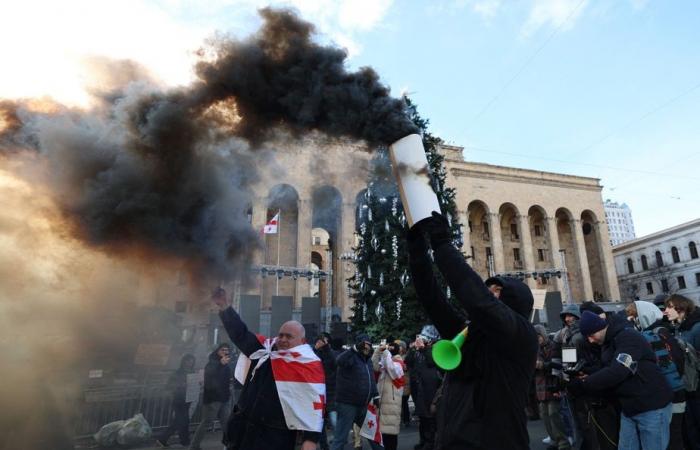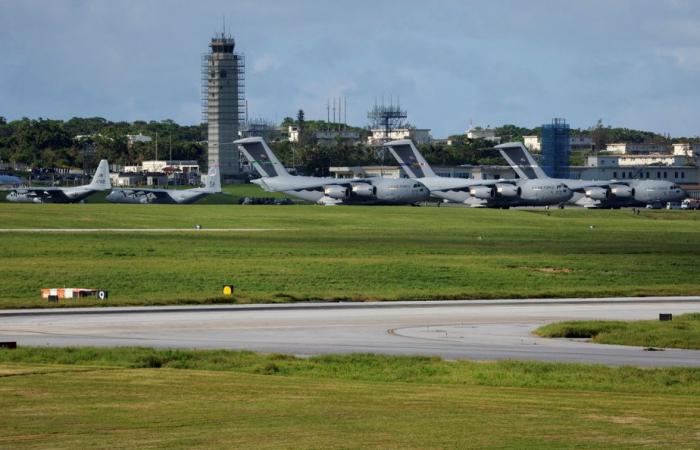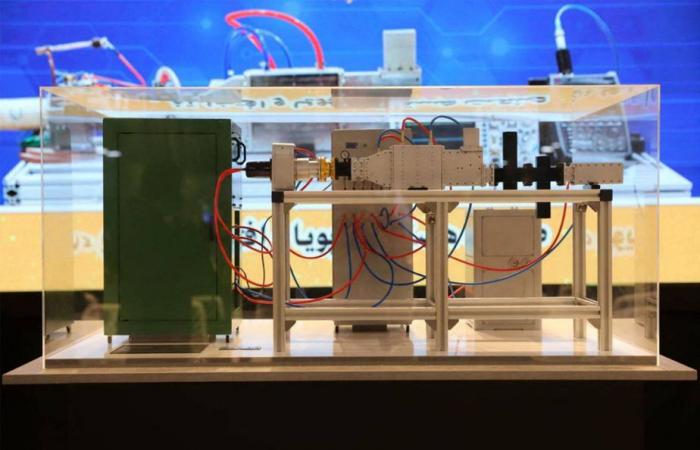Here is some international news in brief.
Posted at 8:32 a.m.
A radical supporter of power has been named the new president of Georgia, shaken by a wave of pro-EU protests. Off the coast of Crete, the sinking of a migrant boat left five people dead and around forty missing.
Georgia: a new president designated in the midst of a political crisis
PHOTO GIORGI ARJEVANIDZE, AGENCE France-PRESSE
Anti-government protesters gather in front of Parliament after the election of Mikheil Kavelashvili as new president, December 14, 2024 in Tbilisi.
An electoral college dominated by the ruling party in Georgia appointed far-right loyalist Mikheil Kavelashvili as its new president on Saturday, in a vote boycotted by the opposition which risks accentuating the ongoing political crisis in this country. Caucasus.
The head of the Georgian electoral commission, Giorgi Kalandarichvili, said the former soccer player was elected with 224 votes. But the current head of state, the pro-Western Salomé Zourabichvili, had previously deemed this vote illegal and said that she would refuse to give up her mandate until new legislative elections had been organized.
The former Soviet republic has been going through unrest since the ruling party, Georgian Dream, claimed victory in the October 26 legislative elections – denounced as rigged by the opposition – and the government decided at the end of November to suspend until 2028 any EU accession negotiations.
Since this decision, pro-EU demonstrations bringing together thousands of people have taken place every evening in front of the Parliament in Tbilisi. The protesters are demanding new elections and accusing the government of turning away from the European path and following a pro-Russian authoritarian drift.
Agence France-Presse
Greece: five dead and dozens missing after the sinking of a migrant boat
Five migrants died on Saturday when their boat sank in the Aegean Sea off the coast of Crete and around forty people are still missing, the Greek coast guard announced.
A large rescue operation is underway to try to find those missing in the maritime area south of Gavdos after the shipwreck which occurred shortly after midnight on Friday. Thirty-nine people were also rescued.
An Italian frigate and two helicopters are operating on the site, while, according to the coast guard, other vessels have headed towards the area of the tragedy.
The first dead person was found on Saturday morning. Another man with symptoms of drowning was taken by helicopter to hospital in Chania, western Crete, where he was admitted to intensive care, according to Greek media reports. In the afternoon, the coast guard told AFP that five migrants had been found dead.
Agence France-Presse
Japan: first transfer of American soldiers stationed in Okinawa
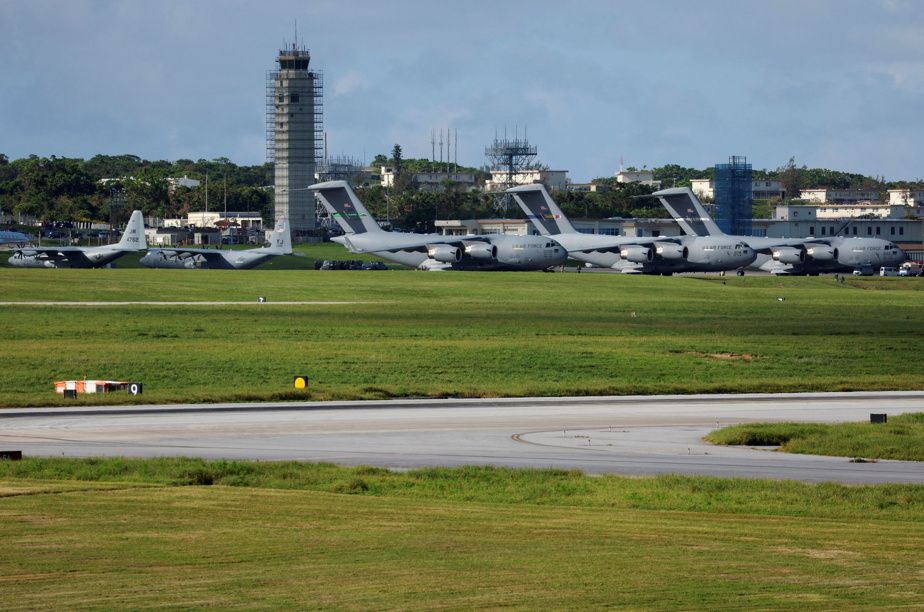
PHOTO ISSEI KATO, ARCHIVES REUTERS
A general view of the US Kadena Air Base on the southern island of Okinawa, Japan, in August 2023
The United States has carried out a first transfer of soldiers stationed on the Japanese island of Okinawa, Tokyo and Washington said on Saturday, after decades of protest by residents over the American military presence.
“The start of the relocation to Guam marks the first phase of moving Marines to locations outside of Japan,” a joint statement said.
The operation began with the transfer of “a small detachment of approximately 100 logistics support Marines” to the U.S. territory of Guam in the Pacific Ocean, the Japanese Defense Ministry and the U.S. Marine Corps said. .
In 2012, the United States announced that it would redeploy 9,000 Marines stationed in Okinawa, whose inhabitants complain of excessive nuisances generated by military activities, particularly linked to noise pollution and helicopter accidents.
The 9,000 soldiers concerned must be transferred elsewhere in the Pacific to Guam, Hawaii or Australia, the United States said.
Agence France-Presse
Nuclear: Iran confirms strengthening of IAEA inspections
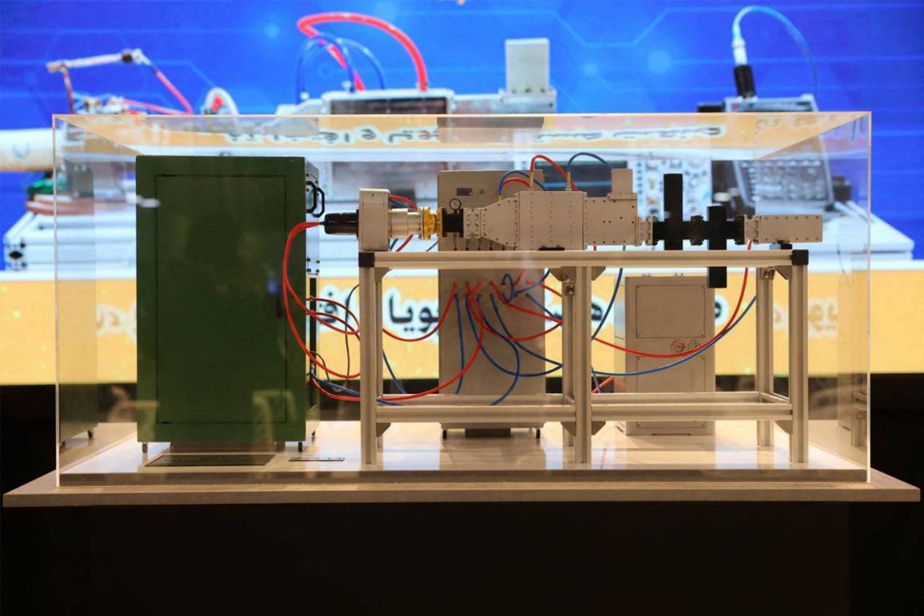
PHOTO IRANIAN ATOMIC ENERGY ORGANIZATION, PROVIDED BY AGENCE FRANCE-PRESSE
This image provided by the Atomic Energy Organization of Iran shows a device believed to be a domestically-made high-power radio frequency generator displayed at the 12e Iran Lab Expo in Tehran, December 14, 2024.
Iran said on Saturday that its nuclear facilities would be subject to increased monitoring by the International Atomic Energy Agency (IAEA), as European countries threatened to reinstate sanctions against them. Tehran.
Iran announced at the end of November the commissioning of new centrifuges for its nuclear program, in retaliation for an IAEA resolution accusing Iran of lack of cooperation in this issue which is poisoning its relations with Western countries.
“We have increased our capacities [nucléaires] and it is natural that the number of inspections increases,” underlined the head of the Iranian Atomic Energy Organization (OIEA), Mohammad Eslami, quoted by the official Irna agency.
Iran has considerably increased its reserves of enriched materials and raised the threshold to 60%, close to the 90% necessary to manufacture an atomic weapon, according to the definition of the IAEA, the UN nuclear watchdog.
The Iranians defend the right to nuclear power for civilian purposes, particularly for energy, and deny wanting to acquire atomic weapons, which Western countries doubt.
Agence France-Presse

